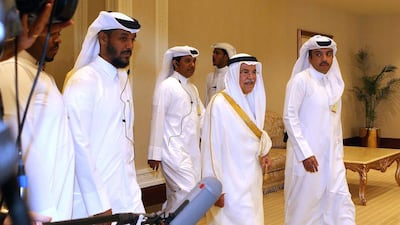The failure of weekend talks in Doha between major oil producers to “freeze” output sent oil prices sharply lower on Monday.
Benchmark North Sea Brent crude futures were down about 3.5 per cent at US41.60 a barrel late in the Gulf day, having hovered just above $40 at the start of trade.
The unexpectedly hardline position by Saudi Arabia over Iran - which had been foreshadowed by comments mid-week by deputy crown prince, Mohammed bin Salman - puzzled some market observers.
Iran hadn’t budged for weeks from its position that it would only join the initiative after it boosted production back to the 4m bpd level seen before international nuclear-related sanctions were imposed in 2012. This was despite efforts last month by Russia’s energy minister, Alexander Novak, to broker a deal between Saudi Arabia and Iran.
“Achieving a deal within Opec, let alone with members outside of it, appears completely off the cards in the current market,” said Ed Bell, commodities analyst at Emirates NBD in Dubai. The next scheduled Opec ministerial meeting is on June 2, which seems particularly pointless now, Mr Bell observed.
Iran has boosted output by about 400,00 bpd following the lifting of sanctions in January, putting average output last month at about 3.2m bpd, according to the International Energy Agency. The increase has been slower than Iranian officials had previously boasted because of the long period without investment in repairs and upgrades, and even Iran’s oil minister Bijan Zangeneh last week conceded it would be a year before output was back to pre-sanctions levels.
Russia and Saudi Arabia had started the output “freeze” effort in February, soon after Iran’s sanctions were lifted, together with Qatar and Venezuela. The talks had faltered because of the Saudi-Iran stand-off in March, when the first planned Doha summit was cancelled.
Russia’s efforts elicited a pledge from Iran that it would at least join the effort after it reached its pre-sanctions output level.
With Saudi Arabia agreeing to Sunday’s talks it had seemed to indicate that a deal could go ahead among the Opec and non-Opec countries that attended, including the UAE, Kuwait, Iraq, Oman, Venezuela and a group of Latin American producers, plus others from Asia. Any deal was expected at most to be a gesture to the market, which had been improving in any case partly because of lower output by most non-Opec producers, especially the US.
Mr Novak expressed his exasperation after the talks broke down: “We expected an agreement would be reached and I thought the countries that have come here did it in a bid to reach an agreement but not to discuss the necessity of participation in this process of countries that did not take part,” he told Russia’s Tass news agency.
The Russian energy minister said Saudi Arabia was joined by its Gulf allies in taking a stand. “These countries [that advanced additional demands] were Saudi Arabia and a number of other Opec countries, such as the UAE, Kuwait, Qatar - mostly countries of the Gulf,” he said.
The focus turned to why Saudi Arabia had taken the course it had, which seems to be driven at least partly by its own internal machinations.
amcauley@thenational.ae
Follow The National's Business section on Twitter

